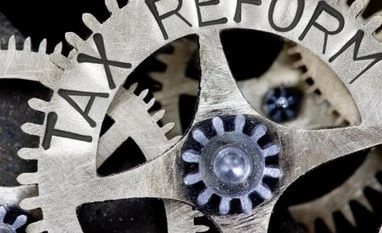The Republican-controlled US Congress will begin voting on Tuesday on the biggest overhaul of the US tax system in more than 30 years, with little standing in the way of the party's first major legislative triumph under President Donald Trump.
The House of Representatives, which introduced initial tax legislation barely six weeks ago on Nov. 2, was poised to act first with a Tuesday afternoon vote.
The Senate could follow on Tuesday night or Wednesday morning, after completing 10 hours of debate, lawmakers said.
With strict party-line votes expected in both chambers, passage appeared all but certain.
Republicans insist that the sweeping package of tax cuts for corporations, small businesses and individuals will boost economic and job growth. They also see the measure as key to having any hope of retaining their majorities in the House and Senate when voters go to the polls next November.
The end-of-year sprint toward passage represents a remarkable recovery of Republican fortunes since the middle of this year, when the party's drive to dismantle former Democratic President Barack Obama's Obamacare healthcare law crumbled in the Senate and prospects for a tax overhaul seemed doomed by party infighting.
Also Read
Lingering doubts about the fate of the tax bill all but vanished on Monday after two of the last Senate Republican holdouts, Susan Collins and Mike Lee, agreed to support the legislation.
"I'm ready to vote," Republican Senator John Kennedy told Reuters. "I felt like we should have voted this weekend."
'New Gilded Age'
Democrats, who unanimously oppose the Republican bill, railed against it as a giveaway to corporations and the wealthy that would add $1.5 trillion to the federal debt over the next decade and deepen the US income gap between rich and poor.
"There are so many rip-offs in this bill that people are going to say this is some kind of new Gilded Age," said Senator Ron Wyden, top Democrat on the Senate Tax Committee.
The House, where Republicans hold a 239-193 voting majority, was likely to see a smattering of "no" votes from Republican fiscal hawks and lawmakers from the high-tax states of New York, New Jersey and California who oppose a provision that would scale back a popular deduction for state and local taxes.
"It's still a bill that's going to give tax relief to other parts of America on the backs of New Yorkers. So I'm still going to vote 'no,'" said Republican Representative Dan Donovan of New York.
The legislation would also repeal a federal fine imposed on Americans under Obamacare for not obtaining health insurance coverage, a change that could undermine the 2010 healthcare law formally known as the Affordable Care Act.
Vice President Mike Pence took the precaution of rescheduling a trip to Egypt and Israel for January to be on hand this week, just in case his tie-breaking voting power is needed to ensure Senate passage of the tax bill.
Republicans, who control the 100-seat Senate by only a 52-48 margin, can afford to lose support from no more than two party lawmakers. Republican Senator Jeff Flake was still undecided late on Monday. Senator John McCain, who has brain cancer, was spending time with family in Arizona.
)